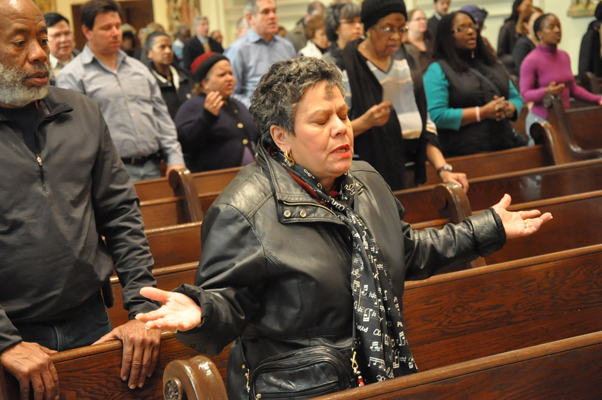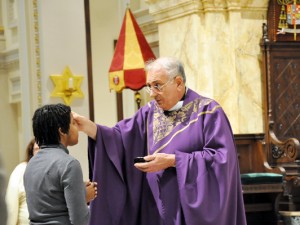by Cindy Wooden, Catholic News Service

ROME (CNS) — Receiving ashes at the beginning of Lent is a call to repentance and humility and a sign that believers know that death will not have the final word in their lives, Pope Benedict XVI said.
The pope’s Ash Wednesday Mass Feb. 22 was preceded by a procession from Rome’s Church of St. Anselm to the Church of Santa Sabina. Unlike last year, when Pope Benedict walked the block between the two churches, this year he rode in a golf cart modified to be a mini-popemobile.
Pope Benedict, 84, has been using a mobile platform to process into St. Peter’s Basilica since last October. Jesuit Father Federico Lombardi, Vatican spokesman, said then that use of the platform was to help the pope conserve his energy and that Pope Benedict had no serious health problems.
During Wednesday’s Mass, the pope received ashes on his head from retired Slovakian Cardinal Jozef Tomko, the cardinal-priest of Santa Sabina.
Before receiving and distributing ashes, Pope Benedict gave a homily focused on the meaning of ashes and of the admonition from the Book of Genesis, “You are dust and to dust you shall return.”

In the Catholic liturgy, ashes are “one of those material signs that bring the cosmos into the liturgy,” he said. They recall both the fact that God created human beings out of the dust of the earth and breathed divine life into them, but also that after Adam and Eve sinned, God cursed the ground and made it bring forth thistles and thorns, the pope said.
With their sin, “the dust of the earth no longer recalls the creative gesture of God, completely open to life, but becomes a sign of the inescapable destiny of death,” he said.
While God punishes people for their sins, the pope said, his punishment is “medicinal” because God is good and loving.
“Along with the just punishment, he also intends to announce a path of salvation that passes precisely through the earth, through that dust, that flesh” taken on by Jesus and given up on the cross for the sins of all, he said.
Distributing ashes is “an invitation to repentance, to humility, to remembering one’s own moral condition, not in order to end up in desperation, but in order to welcome — precisely in our mortality — the unimaginable nearness of God,” the pope said.
While all men and women will die, God “opens the passage to the resurrection (and) to paradise finally rediscovered,” he said.
God sent his son “to our earth devastated by sin” so that “we, prodigal sons and daughters, could return repentant and redeemed by his mercy to our true homeland” in heaven, Pope Benedict said.
Santa Sabina is the “station church” for the first day of Lent. The assigning of a Rome church to a set day during Lent goes back to the fourth century when the pope would move around the city, celebrating Mass in different churches during Lent and on holy days as a sign of the unity of all the city’s Catholics.
